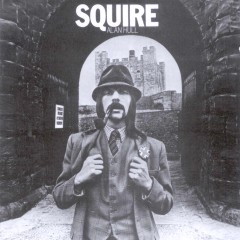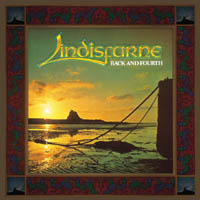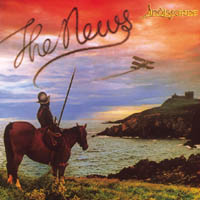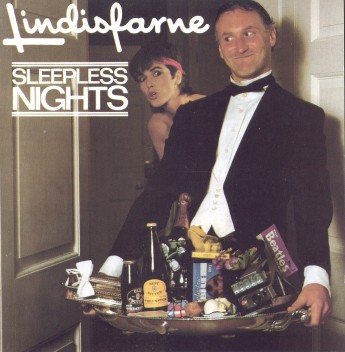Chris Groom & Julia Revell trace the 25-year
career of Tyneside's favourite sons
Part 2
First published in Record Collector issue No. 198, from
February 1996
Atmosphere
The diappointing reception of "Pipedream" was, in part, off-set by the
success of a Lindisfarne live album, recorded at Newcastle City Hall, and issued
in Charisma's budget-price 'CLASS' series. The LP managed to capture the atmosphere and
appeal of their live shows, with Side Two featuring a 24-minute coupling of "We Can
Swing Together" and Woody Guthrie's "Jack Hammer Blues".
To build on their phenomental U.K. success, the band set off on an arduous American
tour, which received amixed reception. By the time they returned home the strain was
starting to show, and in April 1973 Lindisfarne effectively split in two. Alan Hull and
Ray Jackson retained the name and put together a second line-up with keyboard player Kenny
Craddock, Tommy Duffy on bass, Paul Nichols on drums and Charlie Harcourt on guitar.
Lindisfarne MK II went back out on the road almost immediately.
 Meanwhile, Laidlaw, Clements and Cowe recruited Newcastle vocalist Billy Mitchell, and
became Jack The Lad, a more traditional, folk-oriented group which Laidlaw
described as "asort of Geordie Fairport". The group proved to be popular on the
college circuit and went on to record four albums. Three of these were for Charisma -
"It's Jack The Lad", the excellent "Old Straight Track" and "Rough
Diamonds" (produced by Fairport's Simon Nicol) - while the fourth, "Jackpot", appeared on United Artists. By then, though only Ray
Laidlaw and Billy Mitchell remained, the band having gone through a series of personnel
changes. It's worth pointing out that the three JTL Charisma albums havebeen reissued on
CD, and a revised line-up featuring Laidlaw, Mitchell, Jed Grimes, Ian Fairburn and Phil
Murray is once again touring.
Meanwhile, Laidlaw, Clements and Cowe recruited Newcastle vocalist Billy Mitchell, and
became Jack The Lad, a more traditional, folk-oriented group which Laidlaw
described as "asort of Geordie Fairport". The group proved to be popular on the
college circuit and went on to record four albums. Three of these were for Charisma -
"It's Jack The Lad", the excellent "Old Straight Track" and "Rough
Diamonds" (produced by Fairport's Simon Nicol) - while the fourth, "Jackpot", appeared on United Artists. By then, though only Ray
Laidlaw and Billy Mitchell remained, the band having gone through a series of personnel
changes. It's worth pointing out that the three JTL Charisma albums havebeen reissued on
CD, and a revised line-up featuring Laidlaw, Mitchell, Jed Grimes, Ian Fairburn and Phil
Murray is once again touring.
 Lindisfarne MK II recorded two albums in their short time together. The first was
"Roll On Ruby" in February 1974, which kept much the
same sound as before but had a slightly harder edge. Surprisingly, only four of the ten
tracks were written by Hull, though the ballad "When The War Is Over" and
"Taking Care Of Business" were first class material. "Taking Care" was
lifted as a single but, like the album, it sold poorly. Advance publicity for the single
listed the B-side as "Tow The Line", though it eventually turned out to be
"North Country Boy". It would intersting to know if any copies were pressed up
with "Tow The Line" on the flip - however, all the demos I've seen repeat
"Taking Care" on the B-side, and these actually seem easier to find than the
stock single !
Lindisfarne MK II recorded two albums in their short time together. The first was
"Roll On Ruby" in February 1974, which kept much the
same sound as before but had a slightly harder edge. Surprisingly, only four of the ten
tracks were written by Hull, though the ballad "When The War Is Over" and
"Taking Care Of Business" were first class material. "Taking Care" was
lifted as a single but, like the album, it sold poorly. Advance publicity for the single
listed the B-side as "Tow The Line", though it eventually turned out to be
"North Country Boy". It would intersting to know if any copies were pressed up
with "Tow The Line" on the flip - however, all the demos I've seen repeat
"Taking Care" on the B-side, and these actually seem easier to find than the
stock single !
The second 'MK II' album saw the band split from Charisma and their manager Tony
Stratton-Smith. Warner Brothers soon picked them up, and released "Happy Daze" in October 1974. But none of Hull's new songs had
the punch of his previous work, and it was left to Tommy Duffy to provide the best track
(and later single) "Tonight". During the next few months, the group slowed to a
halt, and then disbanded without much fuss.
Squire
 From November 1974 to December 1976, the original Lindisfarne members each went their
own way. Alan Hull produced a second solo album, "Squire",
for Warners, and starred in a BBC-2 play of the same name, written by Tom Pickard for the
series Second City Firsts'. Hull then signed a solo deal with Rocket, forming a band
called Radiator with Kenny Craddock and Ray Laidlaw. The
Radiator LP was later reworked and reissued as a third Hull solo album,
"Phantoms". In 1976, Ray Jackson signed a solo contract with EMI, but the label
only released one single, "Take Some Time", a breach of contract which led to a
court case that Jackson subsequently won. Cowe and Clements took on session work with the
likes of Bert Jansch, Michael Chapman and Ralph McTell (Clements played bass on
"Streets Of London"), while Cowe also toured and recorded with the 7:84 Theatre
Group.
From November 1974 to December 1976, the original Lindisfarne members each went their
own way. Alan Hull produced a second solo album, "Squire",
for Warners, and starred in a BBC-2 play of the same name, written by Tom Pickard for the
series Second City Firsts'. Hull then signed a solo deal with Rocket, forming a band
called Radiator with Kenny Craddock and Ray Laidlaw. The
Radiator LP was later reworked and reissued as a third Hull solo album,
"Phantoms". In 1976, Ray Jackson signed a solo contract with EMI, but the label
only released one single, "Take Some Time", a breach of contract which led to a
court case that Jackson subsequently won. Cowe and Clements took on session work with the
likes of Bert Jansch, Michael Chapman and Ralph McTell (Clements played bass on
"Streets Of London"), while Cowe also toured and recorded with the 7:84 Theatre
Group.
Then in later 1976, Newcastle's Metro Radio approached the original Lindisfarne members
to reform for a local festival. At first they refused, but in December 1976, Alan, Rod,
Ray, Si and Jacka got back together for two sell-out concerts at Newcastle City Hall and,
following their huges success, went back again for two more the following Christmas.
Slick
 Despite denials of a permanent reunion, Lindisfarne finally announced they were back
together for good in May 1978, issuing a new single and album on Mercury and setting off
on a 31-date tour. The LP, "Back And Fourth",
was
produced by Gus Dudgeon, and proved to be a fine comeback, featuring "Warm
Feeling", "Marshall Riley's Army", and their first chart single in years,
"Run For Home", which was also their one-and-only hit in the States. Dudgeon's
slick production received criticism from some quarters, but the album certainly put
Lindisfarne firmly back in the public eye.
Despite denials of a permanent reunion, Lindisfarne finally announced they were back
together for good in May 1978, issuing a new single and album on Mercury and setting off
on a 31-date tour. The LP, "Back And Fourth",
was
produced by Gus Dudgeon, and proved to be a fine comeback, featuring "Warm
Feeling", "Marshall Riley's Army", and their first chart single in years,
"Run For Home", which was also their one-and-only hit in the States. Dudgeon's
slick production received criticism from some quarters, but the album certainly put
Lindisfarne firmly back in the public eye.
 Their relationship with Mercury lasted for two more albums, the live double "Magic In The Air", and "The News".
There were also further singles, of which only "Juke Box Gypsy" made any impact
on the charts. Lindisfarne continued to tour regularly, and their Christmas concerts
became a major annual event, creating a party atmosphere without equal.
Their relationship with Mercury lasted for two more albums, the live double "Magic In The Air", and "The News".
There were also further singles, of which only "Juke Box Gypsy" made any impact
on the charts. Lindisfarne continued to tour regularly, and their Christmas concerts
became a major annual event, creating a party atmosphere without equal.
The budget label Pickwick cashed in with a compilation album, "Lady Eleanor", comprising a mixture of tracks from
"Lindsfarne Live" and "Roll On Ruby", and featuring a picture of the
Mark II line-up on the cover. Although it was bargain-bin fodder at the time, this album
has now ironically become one of their hardest to find. Charisma had already assembled
with the far superior "Finest Hour", including
selections from the first three albums. Later, they came up with "Repeat Performance", a collection of singles and non-album
B-sides such as "Knackers Yard Blues" and the instrumental "Scotch
Mist". This album was quickly deleted and is now hard to find, though it's well worth
the effort.
Throughout the 80s, Lindisfarne survived without a major label deal. Consequently,
their vinyl releases from that period appeared on a maze of independant labels, and were
often very low-key projects. "Friday Girl" came out on Subterranean Records in
1980, while "I Must Stop Going To Parties" appeared through the aptly-named
Hangover label the following year. In 1982, the group formed Lindisfarne Musical
Productions to handle every aspect of their touring, promotion and recording, and four
singles came out on their own LMP label.
Since 1982, a melting pot of Geordie musicians have convened under the name Pacamax for
the occasional 'fun' gig, playing old R&B standards and generally having a good time.
This line-up usually features a mix of Lindisfarne and Jack The Lad members, plus whoever
else is available.
 After a three-year break, a new Lindisfarne album was announced, originally
with the title "Party Politics", though it eventually emerged as "Sleepless Nights". It caused a minor stir because of the
picture of a naked girl on the back cover but, more importantly, it signalled an artistic
return to form with corking tracks like Hull's "Stormy Weather", Clements
"Sunderland Boys", and "Winning The Game", a Jackson/Harcourt
composition.
After a three-year break, a new Lindisfarne album was announced, originally
with the title "Party Politics", though it eventually emerged as "Sleepless Nights". It caused a minor stir because of the
picture of a naked girl on the back cover but, more importantly, it signalled an artistic
return to form with corking tracks like Hull's "Stormy Weather", Clements
"Sunderland Boys", and "Winning The Game", a Jackson/Harcourt
composition.
A curious coupling of "Clear White Light" and Clifford T. Ward's "The
Traveller" appeared on Charisma around this time, but may only have been a
semi-official release. More notably, a brace of live albums, "Lindisfarntastic
I & II", were pressed up to sell at their
Christmas gigs, and a now-collectable four-track Christmas EP was issued in 1985.
 Meanwhile, Laidlaw, Clements and Cowe recruited Newcastle vocalist Billy Mitchell, and
became Jack The Lad, a more traditional, folk-oriented group which Laidlaw
described as "asort of Geordie Fairport". The group proved to be popular on the
college circuit and went on to record four albums. Three of these were for Charisma -
"It's Jack The Lad", the excellent "Old Straight Track" and "Rough
Diamonds" (produced by Fairport's Simon Nicol) - while the fourth, "Jackpot", appeared on United Artists. By then, though only Ray
Laidlaw and Billy Mitchell remained, the band having gone through a series of personnel
changes. It's worth pointing out that the three JTL Charisma albums havebeen reissued on
CD, and a revised line-up featuring Laidlaw, Mitchell, Jed Grimes, Ian Fairburn and Phil
Murray is once again touring.
Meanwhile, Laidlaw, Clements and Cowe recruited Newcastle vocalist Billy Mitchell, and
became Jack The Lad, a more traditional, folk-oriented group which Laidlaw
described as "asort of Geordie Fairport". The group proved to be popular on the
college circuit and went on to record four albums. Three of these were for Charisma -
"It's Jack The Lad", the excellent "Old Straight Track" and "Rough
Diamonds" (produced by Fairport's Simon Nicol) - while the fourth, "Jackpot", appeared on United Artists. By then, though only Ray
Laidlaw and Billy Mitchell remained, the band having gone through a series of personnel
changes. It's worth pointing out that the three JTL Charisma albums havebeen reissued on
CD, and a revised line-up featuring Laidlaw, Mitchell, Jed Grimes, Ian Fairburn and Phil
Murray is once again touring. Lindisfarne MK II recorded two albums in their short time together. The first was
"Roll On Ruby" in February 1974, which kept much the
same sound as before but had a slightly harder edge. Surprisingly, only four of the ten
tracks were written by Hull, though the ballad "When The War Is Over" and
"Taking Care Of Business" were first class material. "Taking Care" was
lifted as a single but, like the album, it sold poorly. Advance publicity for the single
listed the B-side as "Tow The Line", though it eventually turned out to be
"North Country Boy". It would intersting to know if any copies were pressed up
with "Tow The Line" on the flip - however, all the demos I've seen repeat
"Taking Care" on the B-side, and these actually seem easier to find than the
stock single !
Lindisfarne MK II recorded two albums in their short time together. The first was
"Roll On Ruby" in February 1974, which kept much the
same sound as before but had a slightly harder edge. Surprisingly, only four of the ten
tracks were written by Hull, though the ballad "When The War Is Over" and
"Taking Care Of Business" were first class material. "Taking Care" was
lifted as a single but, like the album, it sold poorly. Advance publicity for the single
listed the B-side as "Tow The Line", though it eventually turned out to be
"North Country Boy". It would intersting to know if any copies were pressed up
with "Tow The Line" on the flip - however, all the demos I've seen repeat
"Taking Care" on the B-side, and these actually seem easier to find than the
stock single ! From November 1974 to December 1976, the original Lindisfarne members each went their
own way. Alan Hull produced a second solo album, "Squire",
for Warners, and starred in a BBC-2 play of the same name, written by Tom Pickard for the
series Second City Firsts'. Hull then signed a solo deal with Rocket, forming a band
called Radiator with Kenny Craddock and Ray Laidlaw. The
Radiator LP was later reworked and reissued as a third Hull solo album,
"Phantoms". In 1976, Ray Jackson signed a solo contract with EMI, but the label
only released one single, "Take Some Time", a breach of contract which led to a
court case that Jackson subsequently won. Cowe and Clements took on session work with the
likes of Bert Jansch, Michael Chapman and Ralph McTell (Clements played bass on
"Streets Of London"), while Cowe also toured and recorded with the 7:84 Theatre
Group.
From November 1974 to December 1976, the original Lindisfarne members each went their
own way. Alan Hull produced a second solo album, "Squire",
for Warners, and starred in a BBC-2 play of the same name, written by Tom Pickard for the
series Second City Firsts'. Hull then signed a solo deal with Rocket, forming a band
called Radiator with Kenny Craddock and Ray Laidlaw. The
Radiator LP was later reworked and reissued as a third Hull solo album,
"Phantoms". In 1976, Ray Jackson signed a solo contract with EMI, but the label
only released one single, "Take Some Time", a breach of contract which led to a
court case that Jackson subsequently won. Cowe and Clements took on session work with the
likes of Bert Jansch, Michael Chapman and Ralph McTell (Clements played bass on
"Streets Of London"), while Cowe also toured and recorded with the 7:84 Theatre
Group. Despite denials of a permanent reunion, Lindisfarne finally announced they were back
together for good in May 1978, issuing a new single and album on Mercury and setting off
on a 31-date tour. The LP, "Back And Fourth",
was
produced by Gus Dudgeon, and proved to be a fine comeback, featuring "Warm
Feeling", "Marshall Riley's Army", and their first chart single in years,
"Run For Home", which was also their one-and-only hit in the States. Dudgeon's
slick production received criticism from some quarters, but the album certainly put
Lindisfarne firmly back in the public eye.
Despite denials of a permanent reunion, Lindisfarne finally announced they were back
together for good in May 1978, issuing a new single and album on Mercury and setting off
on a 31-date tour. The LP, "Back And Fourth",
was
produced by Gus Dudgeon, and proved to be a fine comeback, featuring "Warm
Feeling", "Marshall Riley's Army", and their first chart single in years,
"Run For Home", which was also their one-and-only hit in the States. Dudgeon's
slick production received criticism from some quarters, but the album certainly put
Lindisfarne firmly back in the public eye. Their relationship with Mercury lasted for two more albums, the live double "Magic In The Air", and "The News".
There were also further singles, of which only "Juke Box Gypsy" made any impact
on the charts. Lindisfarne continued to tour regularly, and their Christmas concerts
became a major annual event, creating a party atmosphere without equal.
Their relationship with Mercury lasted for two more albums, the live double "Magic In The Air", and "The News".
There were also further singles, of which only "Juke Box Gypsy" made any impact
on the charts. Lindisfarne continued to tour regularly, and their Christmas concerts
became a major annual event, creating a party atmosphere without equal. After a three-year break, a new Lindisfarne album was announced, originally
with the title "Party Politics", though it eventually emerged as "Sleepless Nights". It caused a minor stir because of the
picture of a naked girl on the back cover but, more importantly, it signalled an artistic
return to form with corking tracks like Hull's "Stormy Weather", Clements
"Sunderland Boys", and "Winning The Game", a Jackson/Harcourt
composition.
After a three-year break, a new Lindisfarne album was announced, originally
with the title "Party Politics", though it eventually emerged as "Sleepless Nights". It caused a minor stir because of the
picture of a naked girl on the back cover but, more importantly, it signalled an artistic
return to form with corking tracks like Hull's "Stormy Weather", Clements
"Sunderland Boys", and "Winning The Game", a Jackson/Harcourt
composition.